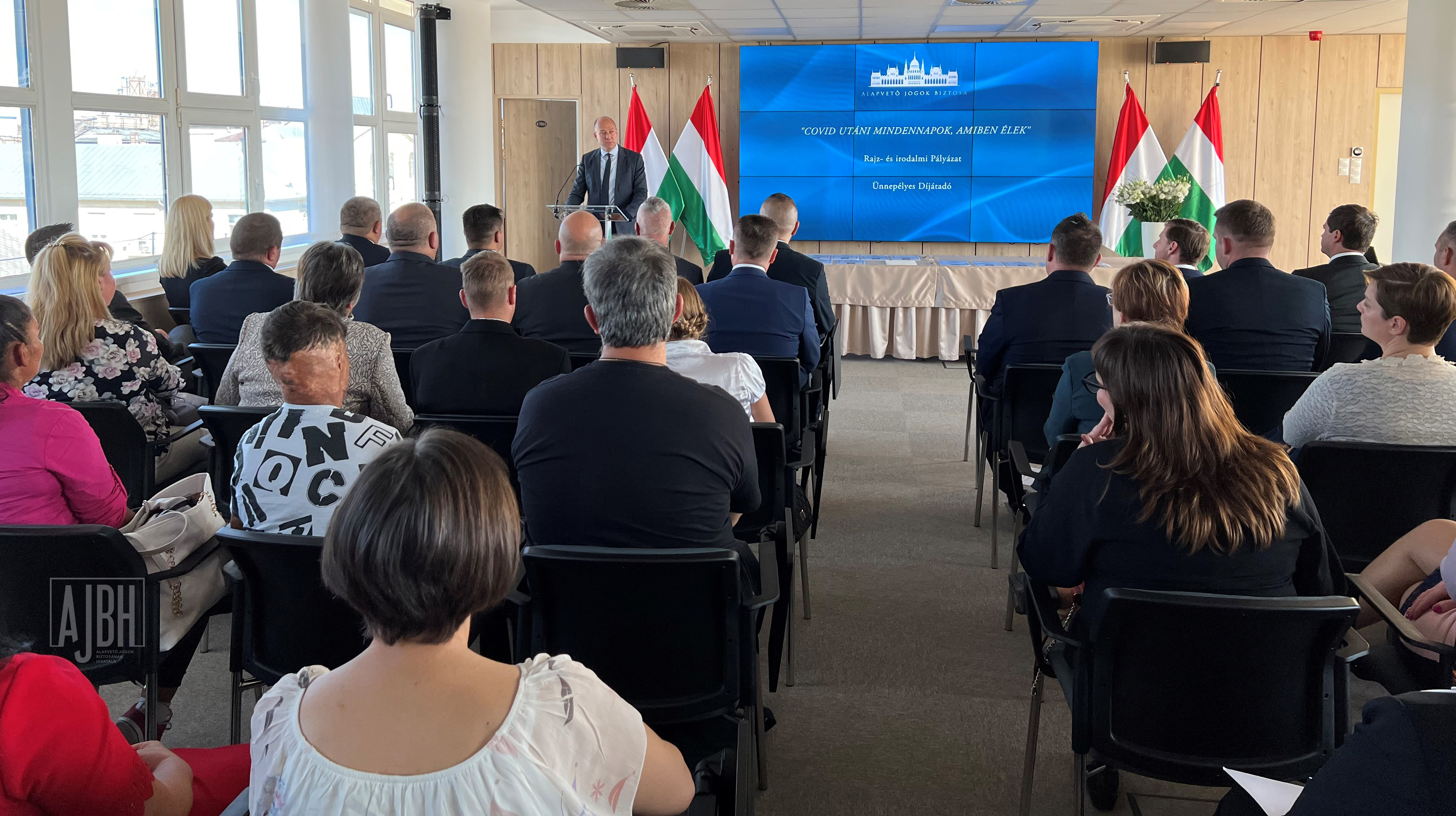Commissioner for Fundamental Rights of Hungary Grants OPCAT NPM Literary and Arts Awards - AJBH-EN
 Prof. Dr. Máté SZABÓ
Prof. Dr. Máté SZABÓ
Commissioner for Fundamental Rights, Hungary
CURRICULUM VITAE
He was elected by the Hungarian Parliament as the Parliamentary Commissioner for Civil Rights for
six years which position he had hold from 26.09.2007. He continues his role and stands as the general
ombudsman of Hungary. From 1st January 2012, Prof. Szabó is Commissioner for Fundamental Rights.
He received his law degree at the Eötvös Loránd University, Faculty of Law in Budapest in
1980 and got a job as a journalist. From 1984, he worked as a scientific associate in the Political
Science Department of the Eötvös Loránd University's Faculty of Law. From 1990, as an associate
professor. He defended his PhD. on social movements in 1987, and got the ‘Doctor of the Political
Science' title from the Hungarian Academy of Science in 1996.
He is a founding member of the Hungarian Political Science Association and the Hungarian
Humboldt Association; furthermore, he is an active member of the Political Science Committee of
the Hungarian Academy of Science and several international associations related to sociology and
political science.
Since 1980, he has continuously carried out several project researches on various subjects of political
and social sciences.
• Between 1991-2007, he was a fellow of the Alexander von Humboldt Foundation in
Hamburg, Berlin, Bremen, Mainz and Frankfurt an der Oder in Germany.
• He was a visiting fellow of the Netherlands Institute of Advanced Studies, Wassenaar, in
1995.
• In 2000, he was a research fellow at the European University Institute in Florence, Italy.
He is specialized in civil society, social movements and political protest and the theory of law and
politics as well. He published more than 300 scientific contributions in Hungarian, English and
German. He is a regular participant at conferences in political science, law, and political sociology
in Europe and around the world. He teaches political science and European studies. Since he was
elected ombudsman, he is an active member of the International Ombudsman Institution and the
European Network of Ombudsman and board member of the European Ombudsman Institute.
Awarded:
• The ‘Erdei Ferenc Prize' of the Hungarian Sociological Association for young talents in 1988.
• The memorial medal ‘For Hungarian Higher Education' of the Ministry of Education for his
teaching career in 2006.
• The ‘István Bibó-Prize' of the Hungarian Political Science Association in 2007, as an
acknowledgement of his life work.
• The Gold Cross of Merit awarded by the President of Poland in 2012, in recognition of his
merits in strengthening human rights and developing Polish- Hungarian relations in this field.
Born in 1956 (13.06.), Budapest-Hungary. Married, and father of two children.
Publications on foreign languages (2007-)
1) Books
Human Rights and Civil Society in Hungary . Twenty Years for Rights and Freedom (1988-2008). OBH,
Budapest, 2009.
2) Studies in volume
Partizipation und Zivilcourage- die neue Ungarn jenseits des Autoritarismus in: Aron Buzogany-Rolf
Frankenberg (Hrsg.): Osteuropa: Politik, Wirtschaft und Gesellschaft. Nomos, Baden-Baden, 2007.
277-291.
Collective Protests in Central European Post-Communist Countries, in: Pero Mladini-Davorka Vidovic
(eds.): Transitions in Central and Eastern European Countries, CPI, Zagreb, 2007. 93-117.
1968 in Hungary, in: Martin Klimke-Joachim Scharloth (ed.): 1968 in Europe. A History of Protest and
Activism, 1956-1977. Palgrave, New York, 2008. 219-229.
(-Kerényi Szabina): Transnational Influences on Patterns of Mobilisation Within Environmental
Movements in Hungary, in: Brian Doherty-Thimothy Doyle (eds.): Beyond Borders. Environmental
Movements and Transnational Politics.Routledge: New York, 2008. 107-125.
Die Zivilgesellschaft Ungarns in einer vergleichenden Perspektive, in: Anton Sterbling (Hrsg.):
Zivilgesellschaftliche Entwicklungen in Südosteuropa. O. Sagner, München, 2009. 205-239.
Kompromiss als Erbe des Kádárismus: Ungarn 1989-1990, in: Jerzy Macków (Hrsg.): Autoritarismus in
Mittel- und Osteuropa. VS Verlag, Wiesbaden, 2009. 199-215.
The Hungarian Ombudsman Institution (1995-2008), in: Linda C. Reif. (eds.): The International
Ombudsman Yearbook. Martinus Nijhoff Publ. Leiden/Boston, 2009.154-182.
Das Wesen von Ungehorsam und Kritik. Ombudsmann-Institution, die osteuropäische Revolution
der Menschenrechte und eine neue Zivilkultur, in: Bálint Balla-Anton Sterbling (Hrsg.): Europäische
Entwicklungsdynamik. Krämer Verlag.Hamburg, 2009. 87-107.
Milestones in the global and European development of human rights, in: Jernej Rovsek/Liana
Kalcina(eds.): 60th Anniversary of the Universal Declaration of Human Rights and the 15th
Anniversary of the Human Rights Ombudsman Act in Slovenia. The Human Rights Ombudsman of
Slovenia, Ljubljana, 2009.88-94.
Demonstration Democracy in Hungary, in: Armen Harutyunyan(eds.): Freedom of Expression-Right to
Fair Trial.Almanac, Erevan(Armenia) 2010. 38-55. in Russian: 214–233; in Armenian: 123–146.
Demokratija Demonstraciji v Vengrija, in: Armen Harutyunyan(ed.): Almanah: Szvabodna
Vürazsenyija Mnenyija. Erevan(Armenia) oroszul 2010.214-233. Uo. örményül 123-146.
Gab es eine politische Ethik der Wende- und wäre diese heute noch gültig? In: András Masát(hrsg.):
Ethik und Alltag. Zwischen Wahrheit und Wirklichkeit. Andrássy Univ.Abhandlungen Nr. 23. 2010.
Budapest, 29-57.
Revisionismus, Liberalismus und Populismus: die Oppositionn in Ungarn, in: Detlef Pollack-
Jan Wielghos (hrsg.): Akteure oder Profiteure? Die demokratische Opposition in den
ostmitteleuropäischen Regimeumgbrüchen 1989.WS-Verlag, Wiesbaden, 2010. 63-83.
Zwischen Reform und Revolution. Ungarns Weg aus der Staatssozialismus-wohin? In: Th.
Grossbölting-Raj Kollmorgen u.a.(Hrsg.): Das Ende des Kommunismus. Die Überwindung der
Diktaturen inn Europa und ihre Folgen. Klartext, Essen, 2010.177-195.
The Hungarian Ombudsman Institution, in: S. Rashidova(ed.): World Ombudsmen. Y-M.M. Publ.
Tashkent, 2010. 58-74.
Defizite der Demokratie oder Machtausübung mit Defiziten? Probleme der Kundgebungen und des
Versammlungsrechts in Ungarn, in: Joachim Jesko von Puttkamer-Gabriele Schubert(Hrsg.): Kulturelle
Orientierungen und gesellschaftliche Ordnungsstrukturen in Südosteuropa. Harrassowitz Verlag,
Wiesbaden, 2010. 221-239.
Ungarn hat gewahlt – aber wie? In: Berliner Debatte/Initial 2010/2. 67–73. (– Sziklay Julia): Die
Institution des Ombudsmanns in den deutschssprachigen; LanderHumboldt-Nachrichten, 2010. No.
32. 11–20.
3) Studies in Journals
Legal and Political Environment of NGO's in Hungary , in: : Annales Universitatis Scientarium
Budapestinensis de Rolando Eötvös Nominate . Sectio Iuridica. Vol. XLIX.2008.23-55.o.
Civil and Uncivil Society in Hungary, in: Central European Political Science Review 2008./33.66-87.
A Transnational Civil Society in Europe: from the point of view of the new post-communist EU-
members, in: Central European Political Science Review Vol. 9. No. 34.2008. 61-94.
Urbanisten versus Populisten in Ungarn, in: Berliner Debatte/Initial 2009/3. 67-74.o.
Disobedience and Criticism. in: Jura 2009/2. 175-185.
Unprotected? Who guards the guardians, in: European Ombudsman Newsletter 2009/12. 58-61.o.
Related to the Tradition of the Extreme Right- Down by Law in the Post-Communist Democracy, in:
Annales 2009/253-277.
The Ethos of Ombudsman's Institution, in: Journal für Rechtspolitik 2010/1. 12-21.o.
null Commissioner for Fundamental Rights of Hungary Grants OPCAT NPM Literary and Arts Awards
The literary and arts competition invited by the Commissioner for Fundamental Rights of Hungary entitled “My Life After Covid” in 2023 was a great success.

Ever since the establishment of the ombudsman institution in Hungary, ombudsmen have been regularly visiting state and local institutions where the residents are persons deprived of, or restricted in their liberty. The objective of the ombudsman’s inspections has been to learn to what extent the fundamental rights of persons who are detained in institutions, or are restricted in their liberty for shorter or longer periods of time due to their age, health condition, difficult situation, or as a result of a judicial order, are respected.
With regard to the knowledge and experience gained from the investigations into the treatment of persons in institutional care, since 1 January 2015, the Commissioner for Fundamental Rights, in addition to performing his general activities of protecting fundamental rights, has performed the responsibilities of the National Preventive Mechanism (NPM) under Article 3 of OPCAT (the Optional Protocol to the Convention against Torture and other Cruel, Inhuman or Degrading Treatment or Punishment) promulgated by Act CXLIII of 2011.
In 2020, the Commissioner for Fundamental Rights was faced with extraordinary challenges in this special competence of his. The social isolation of persons deprived of their liberty living in places of detention, including among others, in penal institutions, social care institutions and children’s homes, increased due to the coronavirus pandemic and the impacts of the epidemic hit those who live in these institutions harder. The vulnerability of people living in close vicinity to each other, often even more exposed to infections due to their condition, was increased by the fact that protection against the pandemic had to be organised in an institutional framework.
The special legal order declared on 11 March 2020, the subsequent transitional measures and the extraordinary measures taken in the period of epidemiological preparedness concerning the places of detention profoundly affected the everyday lives of the persons deprived of their liberty.
After lifting the restrictions, Ombudsman Dr. Ákos Kozma found it especially important to ensure that society gets directly informed, through those concerned, of the everyday lives of these closed communities, as well as the changes in their lives brought about by the pandemic, as in the past few years, everyone could experience the feeling of isolation and even if partially, could identify with the emotional and physical problems of these communities caused by isolation, as well as the difficulties of organising activities and the narrow options of community life offered at that time.
It was to this end that the Commissioner for Fundamental Rights invited a literary and arts competition entitled “My Life After Covid” in 4 categories in 2023, to which entries were expected from the persons living in institutions in the scope of the activities of the NPM. Nearly 1,000 entries from more than 100 institutions were sent to the Office, which greatly exceeded expectations.
Dr. Ákos Kozma greeted the nearly seventy winners of the competition in an award ceremony combined with the exhibition of the winning entries at the Office of the Commissioner for Fundamental Rights on 6 October 2023.
The Commissioner for Fundamental Rights of Hungary and his office hereby thank all the applicants for the outstanding entries and participation, as well as the support provided to the competitors by the institutions, the heads and staff of the institutions with submitting the entries.